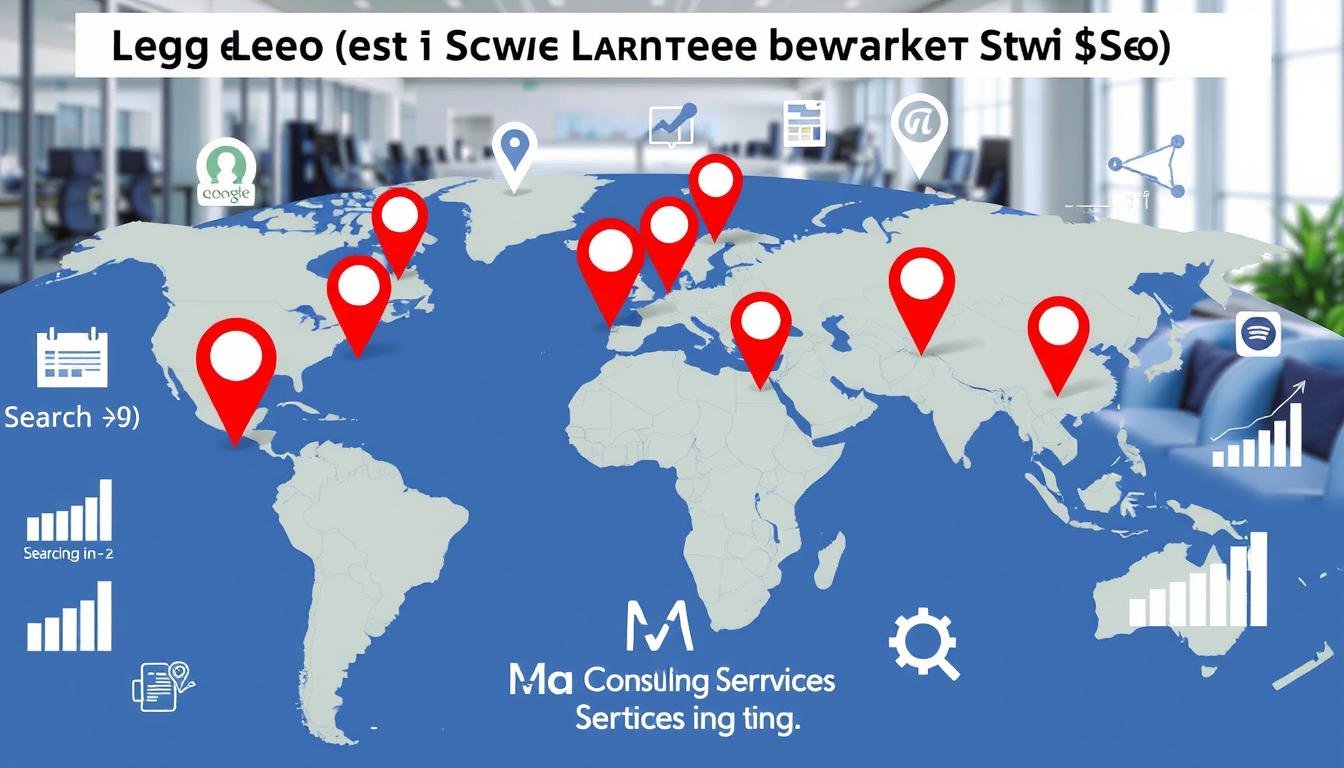
In today’s digital world, local SEO is key for businesses to reach their target market. At the core of this strategy are geo-targeted keywords. These terms are vital for any digital marketing plan aiming to draw in local customers.
Geo-targeted keywords make businesses show up in local search results when people search for products or services nearby. By using city names, neighborhoods, or regional terms in your content, you improve your chances of connecting with local searchers.
Research shows that most online searches include location info. People want to find businesses close to them fast. By optimizing for geo-targeted keywords, you become more visible to these local customers. This targeted approach can boost your click-through rates and conversions.
For businesses with physical locations, focusing on specific cities can lead to better results. This precise targeting lets you tailor your message to local needs and preferences. This makes your brand more relevant and appealing to nearby consumers.
Key Takeaways
- Geo-targeted keywords are crucial for local SEO success
- Most online searches include location information
- Targeting specific cities often outperforms broader area targeting
- Local keyword optimization increases visibility to nearby customers
- Tailored local content can lead to higher engagement and conversions
- Geo-targeting helps businesses appear in relevant local search results
Understanding Geo-Targeted Keywords
Geo-targeted keywords are key for local SEO. They help businesses reach customers in their area. Using city-specific keywords and regional targeting boosts local search visibility.
Definition and Significance
Geo-targeted keywords include location info. They help businesses show up more in local searches. This is vital for service-based businesses like restaurants and contractors who need local customers.
Differences from General Keywords
Geo-targeted keywords focus on specific places. They might include city names or neighborhoods. For example:
| General Keyword | Geo-Targeted Keyword |
|---|---|
| Coffee shops | Coffee shops in Manhattan |
| Plumbers | Plumbers in Los Angeles |
| Yoga classes | Yoga classes in Chicago Loop |
Using geo-targeted keywords brings more relevant traffic. It helps businesses convert local searchers into customers. This targeted strategy helps businesses stand out and gain an edge in their market.
Benefits of Using Geo-Targeted Keywords
Geo-targeted keywords are key for local SEO, helping businesses reach their local audience. They offer big advantages for those looking to connect with people nearby. Let’s dive into the main benefits of using these location-specific terms in your digital marketing.
Increased Visibility in Local Searches
Geo-targeted keywords make your business more visible in local searches. For instance, a plumber in Chicago using “plumber in Chicago” is more likely to show up in local searches. This targeted strategy draws in specific traffic from potential customers nearby.

Using proximity marketing with geo-targeted keywords can greatly boost your local search rankings. By optimizing your Google Business Profile and making location-specific pages on your site, you’re more likely to show up in local searches.
Enhanced Engagement with Local Customers
Geo-targeted keywords help with hyper-local targeting, leading to better engagement with local customers. Using location-specific terms attracts users looking for services in your area. This targeted approach often leads to higher conversion rates than non-targeted campaigns.
| Geo-Targeted Keyword | Potential Benefit |
|---|---|
| Italian restaurants in Houston | Increased local traffic |
| New York City florist | Higher conversion rates |
| Plumber in Chicago | Improved local visibility |
By focusing on local customer engagement with geo-targeted keywords, businesses can create more relevant content. This approach not only boosts search engine rankings but also improves the user experience for local customers.
Implementing Geo-Targeted Keywords in Your Strategy
Adding geo-targeted keywords to your local SEO plan is key to getting noticed and reaching your audience. It’s about finding and using terms that match your location.
Researching Effective Geo-Targeted Keywords
Start by using Google Trends to find great geo-targeted keywords. It shows what people search for in certain areas. Look for keywords related to neighborhoods and zip codes to focus better.
- Analyze search term popularity over time
- Explore “Related topics” and “Related queries” sections
- Use geographic filters to discover regional trends
- Compare multiple search terms for relative popularity
Best Practices for Optimization
After finding your keywords, it’s time to make your site better. Use these terms in your site’s titles, meta descriptions, and headers. Also, create content that talks about local topics or interests.
| Optimization Technique | Description |
|---|---|
| Geo-specific Landing Pages | Develop pages for each location you serve |
| Mobile Optimization | Ensure mobile-friendliness for local searches |
| Local Directory Listings | Maintain consistent NAP across platforms |
| Geo-fencing Keywords | Use location-specific terms in ad campaigns |
Keep an eye on how your campaign is doing. Check your numbers and tweak your plan as needed. By doing this, you’ll improve your local SEO and connect better with your audience.
Measuring the Impact of Geo-Targeted Keywords
It’s key to track how well your geo-targeted keywords are doing. This helps you make your local SEO strategy better. You can use the right tools and look at important metrics to improve your local search visibility.
Tools for Tracking Local SEO Performance
Use tools like Google Analytics, Google Search Console, and local rank tracking software. These tools give you valuable insights into your local SEO performance. With most Google searches happening on mobiles, it’s important to see how your keywords do on different devices.
Analyzing Results and Adjusting Strategies
Look at KPIs like local search visibility, click-through rates, and conversion rates from local traffic. These metrics help you understand if your strategy is working. For example, using geo-targeted keywords can make your site more visible and improve rankings.
Adjust your SEO strategy based on what you learn. This way, you can get better conversion rates and more local traffic. Remember, making content for your location can help turn users into customers. Keep improving your geo-targeting to boost your local SEO and get better results for your business.




